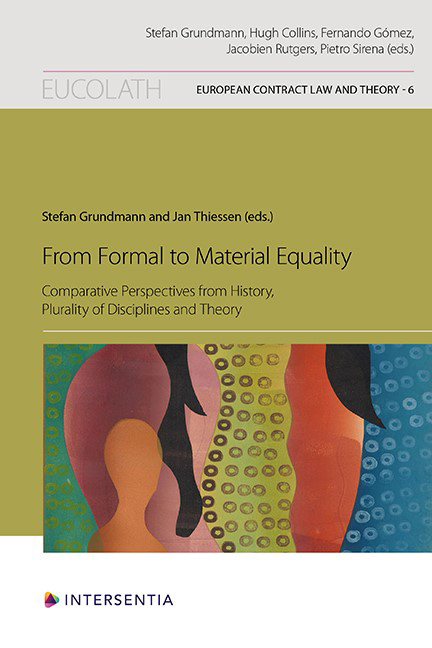 From Formal to Material Equality
From Formal to Material Equality Published online by Cambridge University Press: 15 November 2023
INTRODUCTION
Much of the intellectual allure of economics – including for lawyers – lies in its reductionism. Reductionist theories find richness in parsimony. They trace diverse phenomena back to a few basic principles, preferably a single one. If successful, they uncover commonality in difference, and hidden association between the seemingly unrelated. The more the central principle proves itself through explaining existing regularities, the more it also becomes a benchmark for identifying and critiquing deviations.
For all their possible benefits, reductionist approaches come at a cost. Much received wisdom can no longer be taken for granted, but must be painstakingly deduced from a limited set of principles. Equality in economic theory provides an example. For lawyers and philosophers, it is itself a fundamental principle of justice that neither requires nor lends itself to further justification, and competes only with liberty for precedence. By contrast, equality does not count among the first principles of normative (law and) economics. One might be tempted to conclude that equality of form or substance has no significance for law and economics.
This chapter aims to dispel this perception. To demonstrate that law and economics has a concept of equality, one first has to locate equality within the system of normative economics. Lawyers and philosophers traditionally assign equality to distributive justice ( iustitia distributiva). This suggests that equality should be classified as a problem of distribution also in economics. However, it will become apparent that the economic concept of distribution is narrower than the traditional understanding of distributive justice, because it relates only to the distribution of monetary wealth. It follows that, from an economic point of view, many equality concerns present themselves as issues of efficiency, not distribution. It is here that the advantage of a reductionist approach best shows itself: reconstructing duties of equal treatment from an overarching goal of economic efficiency provides a justification – rather than a mere assertion – of the imposition of such duties and their limitations.
To save this book to your Kindle, first ensure [email protected] is added to your Approved Personal Document E-mail List under your Personal Document Settings on the Manage Your Content and Devices page of your Amazon account. Then enter the ‘name’ part of your Kindle email address below. Find out more about saving to your Kindle.
Note you can select to save to either the @free.kindle.com or @kindle.com variations. ‘@free.kindle.com’ emails are free but can only be saved to your device when it is connected to wi-fi. ‘@kindle.com’ emails can be delivered even when you are not connected to wi-fi, but note that service fees apply.
Find out more about the Kindle Personal Document Service.
To save content items to your account, please confirm that you agree to abide by our usage policies. If this is the first time you use this feature, you will be asked to authorise Cambridge Core to connect with your account. Find out more about saving content to Dropbox.
To save content items to your account, please confirm that you agree to abide by our usage policies. If this is the first time you use this feature, you will be asked to authorise Cambridge Core to connect with your account. Find out more about saving content to Google Drive.